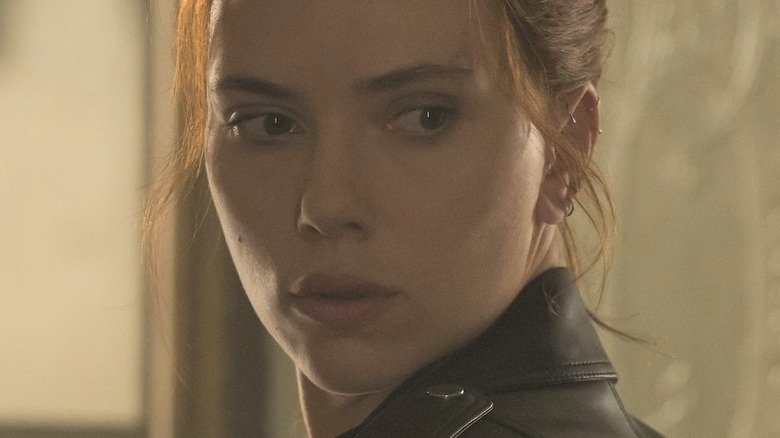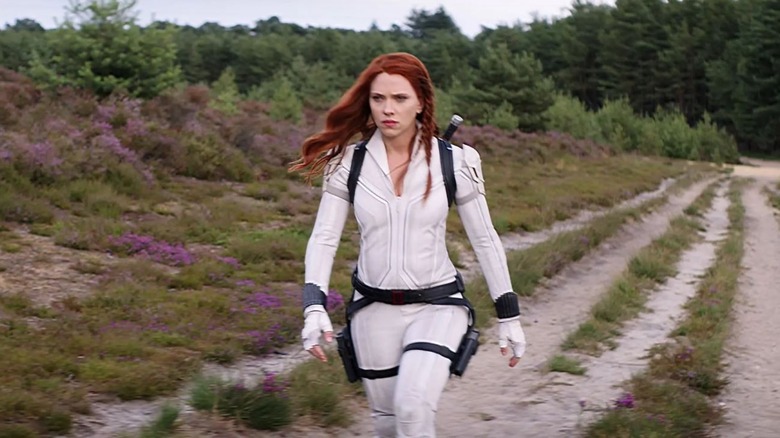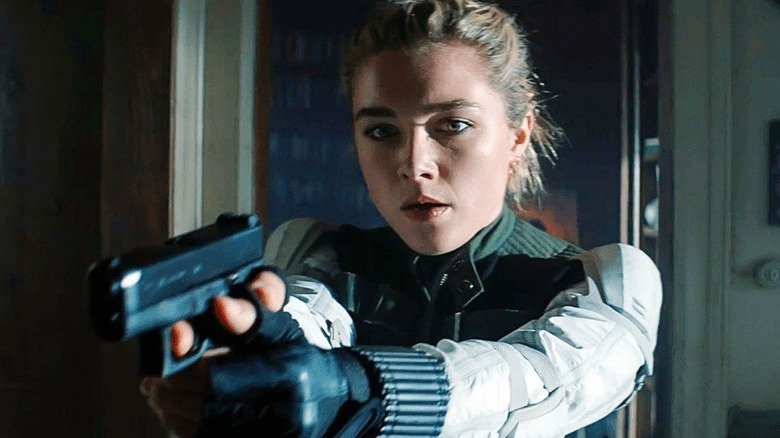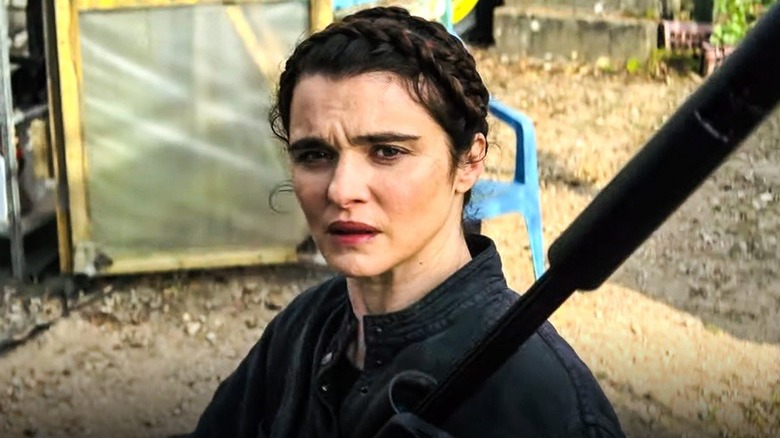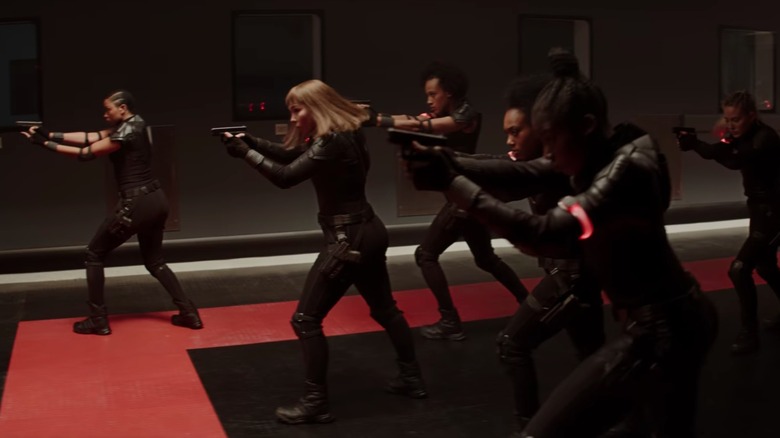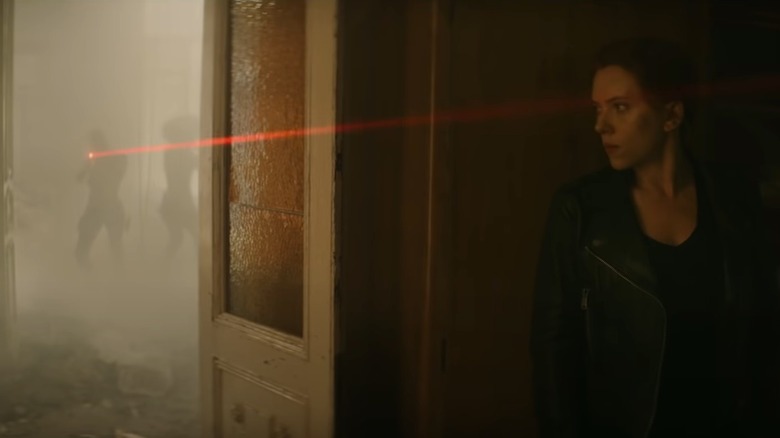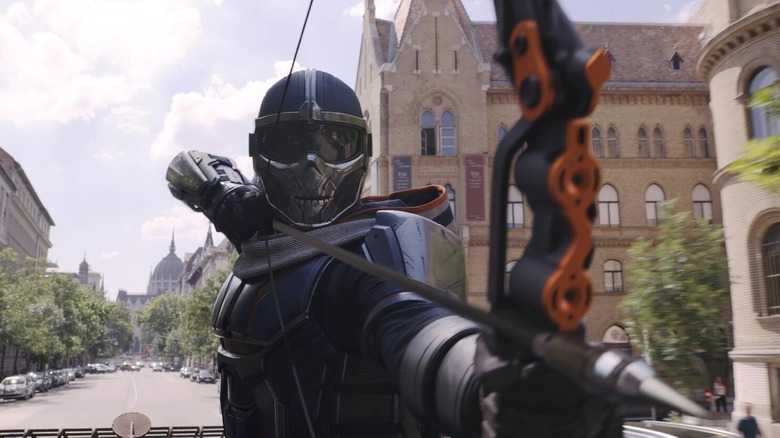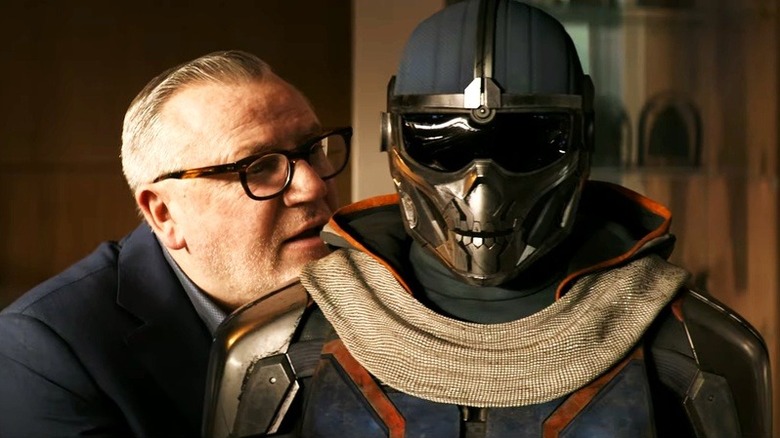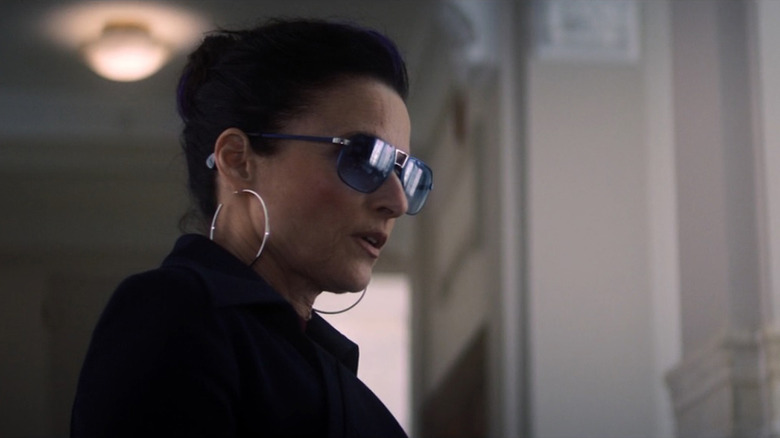The Ending Of Black Widow Explained
Every new Marvel Cinematic Universe film is vital to the overall timeline and sense of worldbuilding, but for a while now, "Black Widow" has felt like a particularly intriguing addition to that larger tapestry. For one thing, it's a film that arrived two years after its title character sacrificed her life. For another, it's a prequel without any of the period trappings of "Captain America: The First Avenger" or "Captain Marvel." It feels a little odd to get a backwards look at the same time the MCU is looking forward with projects like "Shang-Chi and the Legend of the Ten Rings" and "Eternals," but upon closer inspection, "Black Widow" has as much to say about the future as it does about the past.
Though it's very much a solo superhero movie following the title character on an adventure between the events of "Captain America: Civil War" and "Avengers: Infinity War," "Black Widow" actually has a lot to say about the bigger MCU landscape going forward, particularly when it comes to its final act and its ending. So, we're here to break it all down (prepare for spoilers). This is the ending of "Black Widow," explained.
Natasha's future after Black Widow
Examining Natasha Romanoff's ending in "Black Widow" is impossible without taking the prequel nature of the film into account because, of course, we know where she's eventually headed. By the end of the film, she's got the blonde hair we first see her sporting in "Avengers: Infinity War," and one movie later, she sacrifices herself to save her friends in "Avengers: Endgame." It would seem, at first glance, like this movie is just there to set her up for those two installments and nothing more.
But look closer, and "Black Widow" actually primes Natasha for more than her eventual death. Yes, we know she's fated to end up on Vormir, but at the end of this film, it turns out that she — not Steve Rogers or Sam Wilson — is the one who picks up the Quinjet that allows Team Cap to continue running secret missions across the globe for the next two years. When "Black Widow" begins, Natasha declares herself out of the game, but by the end of it, she's got a new sense of purpose, making her the driving force behind the secret Avengers team that heads out to help the world in ways the MCU still hasn't fully shown us. We don't really know exactly how she went about assembling Sam, Steve, and Wanda to go out and help people once again, but now we know she was an integral part of forming the group and not just following her friends into battle.
What's in store for Yelena?
If Natasha's journey in "Black Widow" is about reconnecting to her sense of purpose after losing some of her hope during "Captain America: Civil War," her sister Yelena's journey is about discovering that she can actually have a sense of purpose to call her own. For years, Yelena has served the Red Room and only the Red Room, and when her newfound freedom comes, it merges with all of that cold resolve she developed as a trained killer, turning her into a determined force of nature.
This, of course, naturally sets her up to be the next Black Widow in the MCU, but her path is complicated by the arrival of Contessa Valentina Allegra de Fontaine in her life at some point after the events of the film (as seen in the post-credits scene). Thanks to Val's influence, Yelena has found steady work as a hired gun once again, but whose side is she really on? Does she even know? Is Val's knack for manipulation and temptation simply another form of control that Yelena can feel but not see? However it all shakes out, Yelena came out of "Black Widow" with a new sense of freedom and determination, and the moment she discovers someone is trying to pull her strings, they'd better run in the other direction.
Where did Melina go?
Natasha and Yelena's "mother," Melina Vostokoff, is one of the more fascinating members of the "Black Widow" cast because she seems to jump between two worlds quite comfortably, even for a spy. On the one hand, she's been serving the Red Room in an advanced capacity for a long time, working directly on the subjugation tactics that helped her boss, Dreykov, retain an iron grip on the Widows for years. She seems to have no qualms at all about this, even relishing the technology she's helped develop, right up until she realizes what a dramatic impact it's had on the people she cares about. From there, she's eager to help bring Dreykov down, and by the end of the film, she's apparently found a new place for herself as a kind of caretaker to a group of orphaned Widows.
We don't know yet what Melina does after she and Alexei Shostakov fly off with the Widows in tow. Perhaps she just returns to her farm, helps out when she can, and keeps tending to her pigs. Perhaps she digs deeper into the worldwide espionage community and helps Yelena to free more Widows. Perhaps she just enjoys a quiet retirement. But as long as she's alive, Melina represents an important figure in the MCU underworld, who at any moment could shift the balance of power with what she knows and what she can do with that knowledge.
Alexei's future as the Red Guardian
Of the four "family" members that served undercover in America during the "Black Widow" prologue, Alexei Shostakov might be the most diminished when we meet him again in the present day. While everyone else has had an undoubtedly hard time, at least they weren't left to rot away in prison. And when we eventually catch up with him, Alexei's glory days as the Red Guardian are clearly long gone, but over the course of the film, he comes to find that he might still have some power left in his worn-down super soldier body.
By the end of the movie, Alexei has limped away into the sunset alongside Melina, and where he goes from there, we don't really know. He could choose retirement, of course, but something about his personality and his love of adventure suggests that a longing for his glory days would eventually lure him back out into the world. What that means for the larger superhero community is anybody's guess, but going forward, it's important to remember that there's another super soldier out there in the MCU, particularly after the events of "The Falcon and the Winter Soldier." With a new Captain America and a super-powered U.S. Agent out in the world, Red Guardian might want to make his presence known once again.
What will happen to the rescued Widows?
One of the key themes of "Black Widow" is the exploration of what it really means to have free will and how hard it is to break the cycle of abuse and subjugation when the person controlling it is someone you can't see and can't fight. This is vital to the journey of a number of characters but especially to the squad of nameless Widows that Natasha and Yelena are able to free from the Red Room just as they take it — and Dreykov — down.
By the end of the film, these women have finally regained their grip on their own free will, but they do it without any sense of home or belonging. They just want to get out, and thankfully, they have that option courtesy of Natasha and her family. From there, we don't really know what they'll do. They might feel more comfortable working as a unit, supporting each other and living together as they sort their lives out, or they might drift apart as each one realizes what they want to do and where they want to go. They might even decide they want out of the spy game for good, despite their years of training, and go out in search of the support systems that will allow them to do that. Whatever they do next, though, they'll do it themselves, and that's the key.
What's up with the Lost Widows?
Shortly before his death, Dreykov reveals to Natasha that while his Red Room headquarters might be the hub of his operation, it doesn't begin to convey the full scope of his power. He's got what appears to be hundreds of Widow operatives around the world, all under his direct control, ready to sway world governments at a moment's notice. Fortunately, before the Red Room is destroyed, Natasha manages to copy all of Dreykov's data, giving her the locations of all of these Widows and, perhaps, the opportunity for Yelena and her to free all of them in time.
The key question, though, is what each of these women might do if and when they're freed. How many of them actually like what they're doing and are perhaps predisposed to more villainous tendencies? How many of them will simply become adrift and lost when their purpose is taken away? How many will want to perhaps become future Avengers or maybe SWORD agents? There are a lot of lingering questions — and a lot of potential wild cards — in that data file.
Taskmaster's future
Perhaps no other figure in "Black Widow" better exemplifies Dreykov's legacy of cruelty better than his own daughter, who spends most of the film as the masked figure known as Taskmaster. For years, Natasha has believed that she ordered the murder of Dreykov's daughter, part of the "red" in her ledger that she was going to spend her life wiping clean. But Dreykov actually managed to save the girl ... only to then transform her into a killing machine deployed against his most high-value targets.
By the end of the film, Dreykov's daughter is freed by Natasha and Yelena, but it's still an open question whether she can ever have anything even resembling a normal life. Even more than the other Red Room Widows, she exemplifies the depths of her father's cruelty and ruthlessness. That leaves deep psychological scars along with all the combat skills, and she might never fully heal. But if she does feel like stepping back out into the field, having Taskmaster fighting alongside the good guys would be a sight to see.
Dreykov's legacy
A key point of the "Black Widow" plot is Natasha's realization that Dreykov — the man she thought she'd killed as part of her defection mission to SHIELD — is not only still alive but still running the Red Room from a secret sky base. In fact, his grip on power is tighter than it's ever been. Sure, by the end of the film, Natasha has managed to truly end Dreykov once and for all, but the character's legacy and its ripple effects could be part of the MCU for years to come.
Dreykov wasn't just a charismatic, powerful leader with a firm grasp on what it took to rule from the Red Room. He was also the keeper of a dangerous chemical compound that allowed him to control even those closest to him in perpetuity, a technology he stole from an American lab in 1995 and perfected.
We know from the film that Dreykov wasn't the first to experiment with chemical brainwashing, and we also know that someone else developed a formula to stop his mind-control tech in its tracks. So, what happens now? It's unlikely that Dreykov simply died with no loose ends left in that technological chain. His legacy of pain and control doesn't end with him, and we've perhaps only begun to see the implications of it in the wider MCU. Who knows where that mind-controlling chemical might show up next and in what form?
The Marvel espionage world is getting really interesting
The post-credits scene of "Black Widow" reveals that Yelena has taken a job with Valentina Allegra de Fontaine — an influential woman who wields a still-mysterious amount of power in the Marvel espionage world — and that Val is preparing to send Yelena off to target Clint Barton. Val tells Yelena that Clint is responsible for Natasha's death during "Endgame," which is a stretch, but if there's one thing we learned about Val from "The Falcon and the Winter Soldier," it's that she's not afraid to play fast and loose with the truth to get what she wants.
This one scene creates major ties between "Black Widow," "The Falcon and the Winter Soldier," and the upcoming "Hawkeye" series that will star Clint and his young protege, Kate Bishop. We also know that Yelena will be making an appearance, although we're not sure if she'll get to meet up with characters like John Walker (Val's other major asset at the moment) and Power Broker Sharon Carter in the near future. What we do know, though, is that Yelena's willingness to go deeper into the Marvel espionage world so quickly means that she's primed to be every bit the Black Widow her sister was ... and perhaps even more.
The impact of Natasha's family on Black Widow
Much has been made of Natasha Romanoff's declaration in "Avengers: Endgame" that she had nothing until she found her Avengers "family," particularly in light of "Black Widow" and its status as an "Infinity War/Endgame" prequel. The film's trailers seemed to set up that Natasha actually did have a family in some form all along, so why would she simply discount them in favor of her new superhero pals?
In the end, "Black Widow" does a very good job explaining why Natasha felt that way and why she phrased that much-discussed sentence the way she did. Natasha had what felt like a family as a young girl, only to have it taken away from her, which ultimately drove her to defect, join SHIELD, and become an Avenger. She found a sense of family with the Avengers, and if she hadn't earned that through them, she might never have been able to reconnect with her original family the way she did.
So, by the end of the film, Natasha notes that she actually had two families all along, but it took finding the second one to rediscover the first. It's not a contradiction. It's just a convoluted journey that still allowed her to reach the same conclusion. Becoming an Avenger made her a better person, and the ripple effects of doing good brought her back to something she thought she'd lost long ago.
